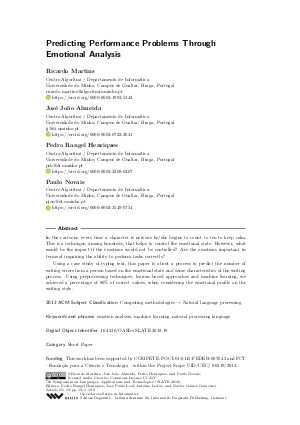Predicting Performance Problems Through Emotional Analysis (Short Paper)
Authors
Ricardo Martins  ,
José João Almeida
,
José João Almeida  ,
Pedro Rangel Henriques
,
Pedro Rangel Henriques  ,
Paulo Novais
,
Paulo Novais 
-
Part of:
Volume:
7th Symposium on Languages, Applications and Technologies (SLATE 2018)
Part of: Series: Open Access Series in Informatics (OASIcs)
Part of: Conference: Symposium on Languages, Applications and Technologies (SLATE) - License:
 Creative Commons Attribution 3.0 Unported license
Creative Commons Attribution 3.0 Unported license
- Publication Date: 2018-07-13
File

PDF
OASIcs.SLATE.2018.19.pdf
- Filesize: 427 kB
- 9 pages
Document Identifiers
Subject Classification
ACM Subject Classification
- Computing methodologies → Natural language processing
Keywords
- emotion analysis
- machine learning
- natural processing language
Metrics
- Access Statistics
-
Total Accesses (updated on a weekly basis)
0PDF Downloads0Metadata Views
Abstract
In the cartoons, every time a character is nervous he/she begins to count to ten to keep calm. This is a technique, among hundreds, that helps to control the emotional state. However, what would be the impact if the emotions would not be controlled? Are the emotions important in terms of impairing the ability to perform tasks correctly? Using a case study of typing text, this paper is about a process to predict the number of writing errors from a person based on the emotional state and some characteristics of the writing process. Using preprocessing techniques, lexicon-based approaches and machine learning, we achieved a percentage of 80% of correct values, when considering the emotional profile on the writing style.
Cite As Get BibTex
Ricardo Martins, José João Almeida, Pedro Rangel Henriques, and Paulo Novais. Predicting Performance Problems Through Emotional Analysis (Short Paper). In 7th Symposium on Languages, Applications and Technologies (SLATE 2018). Open Access Series in Informatics (OASIcs), Volume 62, pp. 19:1-19:9, Schloss Dagstuhl – Leibniz-Zentrum für Informatik (2018)
https://doi.org/10.4230/OASIcs.SLATE.2018.19
BibTex
@InProceedings{martins_et_al:OASIcs.SLATE.2018.19,
author = {Martins, Ricardo and Almeida, Jos\'{e} Jo\~{a}o and Henriques, Pedro Rangel and Novais, Paulo},
title = {{Predicting Performance Problems Through Emotional Analysis}},
booktitle = {7th Symposium on Languages, Applications and Technologies (SLATE 2018)},
pages = {19:1--19:9},
series = {Open Access Series in Informatics (OASIcs)},
ISBN = {978-3-95977-072-9},
ISSN = {2190-6807},
year = {2018},
volume = {62},
editor = {Henriques, Pedro Rangel and Leal, Jos\'{e} Paulo and Leit\~{a}o, Ant\'{o}nio Menezes and Guinovart, Xavier G\'{o}mez},
publisher = {Schloss Dagstuhl -- Leibniz-Zentrum f{\"u}r Informatik},
address = {Dagstuhl, Germany},
URL = {https://drops.dagstuhl.de/entities/document/10.4230/OASIcs.SLATE.2018.19},
URN = {urn:nbn:de:0030-drops-92773},
doi = {10.4230/OASIcs.SLATE.2018.19},
annote = {Keywords: emotion analysis, machine learning, natural processing language}
}
Author Details
- Centro Algoritmi / Departamento de Informática, Universidade do Minho, Campus de Gualtar, Braga, Portugal
- Centro Algoritmi / Departamento de Informática, Universidade do Minho, Campus de Gualtar, Braga, Portugal
- Centro Algoritmi / Departamento de Informática, Universidade do Minho, Campus de Gualtar, Braga, Portugal
Funding
This work has been supported by COMPETE: POCI-01-0145-FEDER-0070 43 and FCT - Fundação para a Ciência e Tecnologia - within the Project Scope UID/CEC/ 00319/2013.
References
-
Ritwik Banerjee, Song Feng, Jun Seok Kang, and Yejin Choi. Keystroke patterns as prosody in digital writings: A case study with deceptive reviews and essays. In Conference on Empirical Methods in Natural Language Processing (EMNLP), pages 1469-1473, 2014.

-
Paul Ekman. An argument for basic emotions. Cognition &emotion, 6(3-4):169-200, 1992.

-
Paul Ekman and Richard J. Davidson. The nature of emotion: Fundamental questions. Oxford University Press, 1994.

-
Carroll E. Izard. Human emotions. Springer Science &Business Media, 2013.

- Matthew L. Jockers. Syuzhet: Extract Sentiment and Plot Arcs from Text, 2015. URL: https://github.com/mjockers/syuzhet.
-
Christopher Manning, Mihai Surdeanu, John Bauer, Jenny Finkel, Steven Bethard, and David McClosky. The Stanford CoreNLP natural language processing toolkit. In 52nd Annual Meeting of the Association for Computational Linguistics, pages 55-60, 2014.

- Ricardo Martins, José João Dias de Almeida, Pedro Rangel Henriques, and Paulo Novais. Increasing authorship identification through emotional analysis. In Trends and Advances in Information Systems and Technologies, volume 745, pages 763-772. Springer International Publishing, 2018. URL: http://dx.doi.org/10.1007/978-3-319-77703-0_76.
-
Robert R. McCrae and Oliver P. John. An introduction to the five-factor model and its applications. Journal of personality, 60(2):175-215, 1992.

-
Scott Meier, Patricia R. McCarthy, and Ronald R. Schmeck. Validity of self-efficacy as a predictor of writing performance. Cognitive therapy and research, 8(2):107-120, 1984.

- Saif Mohammad and Peter D. Turney. Crowdsourcing a word-emotion association lexicon. Computational Intelligence, 29(3):436-465, 2013. URL: http://dx.doi.org/10.1111/j.1467-8640.2012.00460.x.
-
Robert Plutchik. Emotion: A psychoevolutionary synthesis. Harpercollins College Division, 1980.

-
Mike Thelwall, Kevan Buckley, Georgios Paltoglou, Di Cai, and Arvid Kappas. Sentiment strength detection in short informal text. Journal of the Association for Information Science and Technology, 61(12):2544-2558, 2010.

